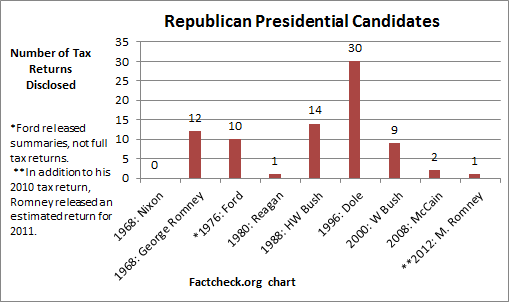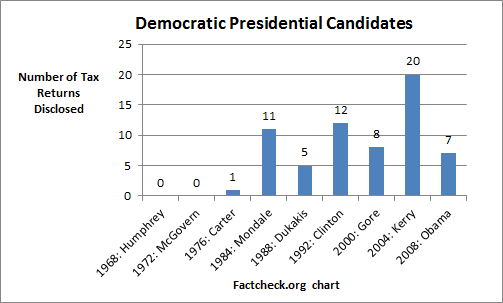Barack Obama did a nice job of debunking Mitt Romney’s plan to cut taxes for the wealthy in the second presidential debate. He also pointed out that Romney, according to his tax estimate for 2011, paid a “lower tax rate than a nurse or a bus driver.” But Obama failed to make another significant point: Romney has still not released many crucial details about his tax returns.
The media have stopped pressing Romney for more information about his tax history, which is unfortunate, since there’s still a lot we don’t know. The 2010 tax return Romney released in January, which showed that he paid a rate of 13.9 percent in income taxes, did not provide details about his offshore accounts in places like Switzerland, Bermuda and the Cayman Islands. (In his 2011 tax returns, where he claimed to pay a rate of 15.4 percent, Romney did not check the box indicating he had any foreign accounts.) And he released only a brief summary of his taxes from 1990 to 2009, when he claims to have paid an average of 20.2 percent in federal income taxes.
Romney’s lack of financial disclosure is virtually without precedent. According to Fact-Check.Org:
It’s true that in the 2008 election, Republican nominee McCain released just two years of tax returns. But you have to go back more than 30 years—to President Ronald Reagan, who released one year’s return in 1980—to get to a major party nominee who released less than five years of tax returns.
Over those three decades, the number of years of released tax returns went from a high of 30 by Republican Bob Dole in 1996 to a low of five by Democrat Michael Dukakis in 1988.

In 2000, George W. Bush released nine years of tax returns and Al Gore released eight. John Kerry released twenty years in 2004. Barack Obama released seven years in 2008. McCain only released two years in 2008, but, aside from forgetting how many houses he owned, McCain’s financial accounting was far less complex than Romney’s. George Romney famously released twelve years of tax returns, saying, “one year could be a fluke, perhaps done for show.”

Popular
"swipe left below to view more authors"Swipe →
Here’s what we still don’t know about Romney’s taxes:
Along with his missing Report on Foreign Bank and Financial Accounts (FBAR) from 2010, Romney should have released a 990-T form for his IRA, which is for unrelated business taxable income. That includes income from private equity accounts, which Romney has in his IRA. The fact that Romney hasn’t released such a form “suggests he owns them through an offshore blocker corporation,” said Rebecca Wilkins, senior counsel for Citizens for Tax Justice. “That would be entirely at odds with his statement that his offshore investments have never saved him a dime in US income taxes.”
Romney’s massive, tax-free IRA is estimated to hold between $18 to $87 million. “You can hardly get your head around it,” said Wilkins. “Congress never, ever anticipated that anyone would have $87 million in their IRA.” Even by the standards of the super-rich, Romney’s IRA is super-sized. Wilkins did tax planning for wealthy clients for twenty-one years and said, “‘I never saw a $10 million retirement plan—certainly never saw anything in neighborhood of $87 million.” She said that, “the Treasury is losing somewhere between 250,000 and $3 million a year in tax revenues on Romney’s earnings from his IRA.”
Then there’s the manipulation of his tax returns from 1990–2009. “We know almost nothing about them and they’re completely misleading,” Wilkins said. “The way PricewaterhouseCoopers computed the average rate was a total joke.” The accounting firm took the rate from each year without accounting for how much Romney made in a given year. For example, if Romney paid 35 percent in taxes on $250,000 in income one year and 15 percent in taxes on $50 million another year, his weighted average “is going to be a lot lower than what he reported—closer to 15 percent,” Wilkins said.
Romney has said, “I never paid less than 13 percent” in taxes, but there’s no way to verify that claim based on the limited documentation his campaign has released. Nor can we say definitively that Harry Reid was wrong to suggest that Romney didn’t pay any taxes for a decade. “Unless we see the returns, you can’t say that’s not true,” said Wilkins. “It’s quite possible there were some years when he never paid taxes.”
Wilkins points to a few pieces of damning suggestive evidence. “In the early nineties, Romney made the decision at Bain Capital to move funds to the Cayman Islands to attract investors who didn’t want to pay taxes,” said Wilkins. Romney said in August that “big business is doing fine in many places” by exploiting “low tax havens around the world for their businesses.” Romney, evidently, has done the same.
Reports Mother Jones:
Romney has investments in a number of well known tax havens, including Ireland, Luxembourg, the Cayman Islands, and Bermuda. Until 2010, he held a few million in the Swiss bank UBS, which in 2009 was forced to pay the US $780 million in fines and penalties for helping more than 17,000 Americans commit tax fraud by hiding as much as $20 billion overseas. The total value of Romney’s offshore investments is unknown, but his tax returns have revealed that he has at least $30 million invested in the Cayman Islands, in at least 12 different Bain Capital funds.
Similarly, Romney was chair of the audit committee at Marriott from 1993-1998 when the hotel chain undertook what Peter Canellos, a former chair of the New York State Bar Association Tax Section and Ed Kleinbard, a law professor at USC, called “perhaps the largest tax avoidance scheme in history.” According to Bloomberg: “During Romney’s years on the board, Marriott’s effective tax rate dipped as low as 6.8 percent, compared with the federal corporate statutory rate of 35 percent.” Said Wilkins: “There’s no way he didn’t know about it. If he was willing to sign off on it for Marriott, why wouldn’t he do that himself?”
Why does this matter? “We can see in the Romneys’ returns a myriad of ways that high-income taxpayers can reduce their tax rates that just aren’t available to ordinary taxpayers,” said Wilkins. “The returns confirm what most Americans believe about the federal income tax system—that it’s rigged in favor of the rich. And we know from Romney’s tax proposals that he has no plans to change that.”
Under Romney and Ryan’s tax plans, people making over $1 million would get an average tax cut of between $250,000 to $400,000 a year, according to Citizens for Tax Justice. Romney can only pay for that massive tax cut for the wealthy by exploding the deficit, like George W. Bush did, or by drastically cutting the social safety net, as Ryan has proposed to do. Either policy would be unpopular, which is why Romney has released so few details about how he’d pay for his tax cuts. Romney’s tax history gives us a clue as to how he would govern—and that’s why the candidate wants to leave us in the dark.
For more on Mitt’s tax returns, check out Ben Adler on “Romney’s Ungenerous Donations.”


